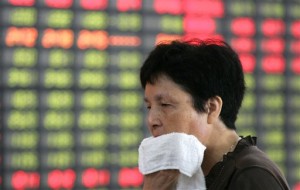
An investor looks at the stock price monitor at a private securities company Monday, July 9, 2012 in Shanghai, China. Asian stocks were lower Monday while markets in Europe were steady after a disappointing U.S. jobs report stoked concern that the world's biggest economy remains mired in weak growth. AP PHOTO
HONG KONG—Asian markets slumped on Monday after disappointing US jobs data raised fresh fears about the world’s biggest economy and amid renewed concern about China’s slowing growth.
Investors are nervous ahead of the release of key Chinese economic indicators this week, with comments by Premier Wen Jiabao at the weekend adding to the concerns, which overshadowed positive news in the form of a sharp slowdown in inflation.
Hong Kong tumbled 1.88 percent, or 372.55 points, to end at 19,428.09, their largest percentage loss for more than a month, while Shanghai plunged 2.37 percent, or 52.77 points, to finish at 2,170.81.
Tokyo fell 1.37 percent, or 123.87 points, to end at 8,896.88, with a set of weak figures from its domestic economy adding to negative sentiment.
Seoul slipped 1.19 percent, or 22.07 points, to close at 1,836.13, and Sydney ended 0.95 percent, or 39.5 points, lower at 4,118.3.
The drop in Sydney stocks “has predominantly been about our market following the leads of the US market and its disappointment in yet another sub-par jobs report,” said Cameron Peacock, an analyst at IG Markets.
In his comments at the weekend, Wen warned that “downward pressure is still relatively big” on the Chinese economy, although he also said that the economy was generally stable, according to the official Xinhua news agency.
Combined with a surprise interest rate cut last week, the second in a month, the remarks heightened investor fears about China before the release of key data, including second quarter GDP, on Friday.
Figures from the National Bureau of Statistics showed that the consumer price index rose by 2.2 percent year on year last month, the lowest rate since the start of 2010.
While it gives the government a freer hand to act to boost growth, which slipped to an annual 8.1 percent in the first quarter, it did little to allay investor fears.
“Investors are worried that China’s move last week to cut rates ahead of the release of data indicates growth remains sluggish,” Amy Lin, an analyst at Capital Securities, told Dow Jones Newswires.
Meanwhile, official data released Friday after Asian markets closed showed that the US economy added only 80,000 jobs in June, well below expectations, leaving the unemployment rate at 8.2 percent.
It was the latest disappointing economic report from the US and came shortly after International Monetary Fund chief Christine Lagarde warned that the fund would be cutting its global growth forecasts later this month.
US markets closed lower Friday after the jobs report, with the Dow Jones Industrial Average down 0.96 percent, the S&P 500 losing 0.94 percent and the tech-rich Nasdaq dropping 1.30 percent.
In Europe, London was down 0.53 percent, Frankfurt shed 1.92 percent and Paris lost 1.88 percent.
In Japan, official data showed the surplus in the country’s current account, the broadest measure of trade with the rest of the world, plunged 62.6 percent to 215.1 billion yen ($2.7 billion) in May from a year earlier.
That was well below the 511 billion yen surplus expected by economists, according to Dow Jones Newswires, with separate data pointing to weakness in new investment by corporate Japan.
Investors were also looking to a meeting in Brussels later in the day of eurozone finance ministers, who are under pressure to flesh out a plan agreed last month to helping the ailing currency bloc.
On currency markets in early European trade, the euro was changing hands at $1.2307 against $1.2287 in New York late Friday, its lowest since July 2010.
The euro bought 97.96 yen from 97.83 yen in US trade on Friday, while the dollar fetched 79.57 yen in Tokyo, little changed from 79.62 yen in New York
On oil markets, New York’s main contract, West Texas Intermediate light sweet crude for delivery in August, gained 38 cents to $84.83 a barrel and Brent North Sea crude for August delivery rose 55 cents to $98.74.
Gold was worth $1,585.20 an ounce at 1100 GMT, compared with $1,594.70 late Friday.
In other markets:
— Taipei fell 0.80 percent, or 58.63 points, to 7,309.96.
Smartphone maker HTC shed 5.59 percent to Tw$304.0 while Chunghwa Telecom was 0.21 percent higher at Tw$95.4.
— Wellington edged up 0.04 percent, or 1.49 points, to 3,480.19.
Telecom Corp. added 1.4 percent to NZ$2.49 and Fletcher Building was down 1.12 percent at NZ$6.20.
— Manila closed down 1.84 percent, or 98.94 points, at 5,263.74.
Lepanto Mining shed 5 percent to 1.39 pesos and Philippine Long Distance Telephone Co. fell 0.94 percent to 2,728 pesos.
— Singapore closed down 1.66 percent, or 49.47 points, at 2,929.08 points.
Singapore Telecommunications eased 1.49 percent to Sg$3.31 and DBS dropped 0.99 percent to Sg$13.95.
— Jakarta closed 1.73 percent, or 70.15 points, lower at 3,985.05.
Aneka Tambang fell 3.6 percent to 1,340 rupiah, Astra International slid 2.88 percent to 6,750 rupiah and Indofood lost 0.95 percent to 5,200 rupiah.
— Bangkok fell 1.09 percent, or 13.13 points, to 1,186.95.
Banpu dropped 1.74 percent to 452 baht, while PTT lost 2.10 percent to 327 baht.
— Kuala Lumpur edged down 0.01 percent, or 0.24 points, to 1,620.31.
Genting Malaysia and PPB Group each fell 1.9 percent to 3.61 ringgit and 15.78 respectively.
— India’s Sensex index fell 0.74 percent, or 129.14 points, to 17,391.98 on Monday, its second straight day of losses, tracking weak global markets and fears of quarterly earnings growth data from Indian firms.
Private steel maker Jindal Steel slid 2.56 percent to 443.5 rupees while India’s largest passenger car maker Maruti Suzuki fell 2.28 percent to 1,189.